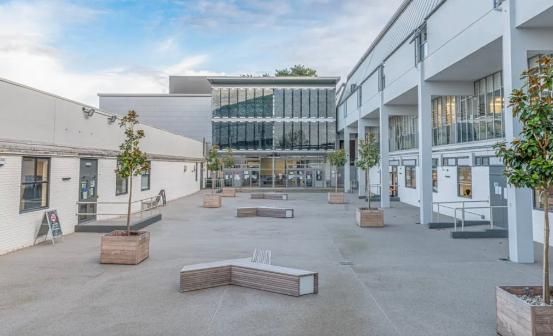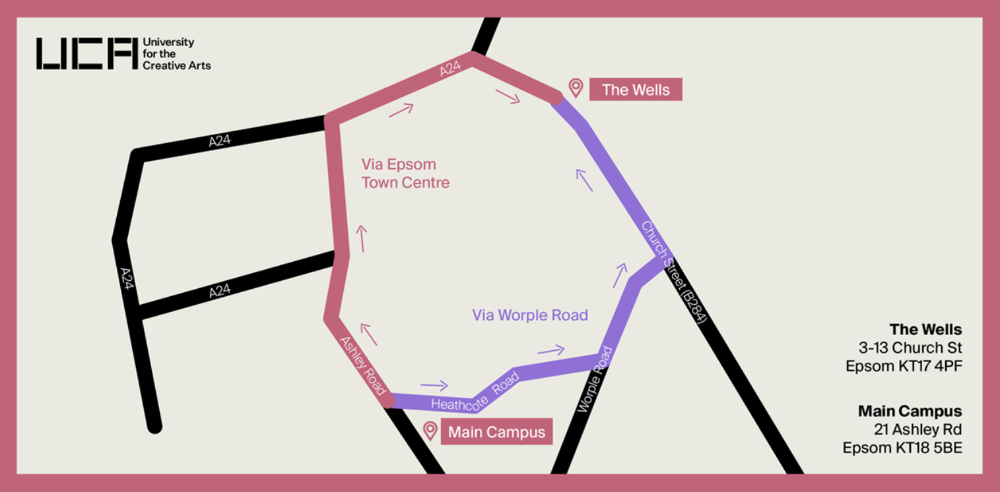Material / Machine
An Embodied vs Synthetic Debate in Creative Education - 17th June 2026
Welcome to the UCA Creative Education Conference 2026, where we explore the meeting point of the Embodied and the Synthetic. This year’s theme, Material/Machine, invites educators, makers, academics, technicians, librarians, leaders, policymakers, and students to interrogate the tensions and harmonies between material intelligence and digital automation.
We are rethinking what it means to learn, make, and create in a cross-disciplinary world where physical and digital processes intertwine. How can we design learning environments that honour embodied practice while embracing synthetic innovation? How do we protect authorship and integrity while expanding participation and aesthetic diversity?
Closes Monday 2nd March 2026
Three Interlocking Strands
The conference is structured around three strands: Embodied, Machine, and Bridge. Collectively, they invite us to interrogate the pedagogic tools we use and how ways of knowing, making and relating are reshaped when material and synthetic practices meet.
As well as examining the analogue and digital as opposing forces, the three strands invite contributions that examine nuance: where do tactile, situated practices still matter most? Where do automated systems genuinely extend creative possibility? And what happens in messy spaces in between the generative?
Strand 1: Embodied – Material Intelligence in a Digital Age
This strand centres practices where bodies, materials and places do the primary pedagogical work.
We invite contributions that:
- Champion making as a sensory, situated, and relational act;
- Explore studios, workshops, libraries, labs and communities as learning ecologies;
- Examine how touch, gesture, rhythm, repetition, and craft knowledge shape identity, confidence and belonging;
- Push back against the idea that all practice must be digitised, automated, or datafied to be valued.
Embodied does not mean anti-digital, and instead asks what is lost when material intelligence is treated as optional.
Strand 2: Machine – Synthetic, Automated, Scalable
This strand focuses on synthetic and automated systems: from generative AI and Large Language Models to algorithmic curation, smart tools, and immersive digital platforms.
We invite contributions that:
- Critically examine how machine led processes are reframing authorship, originality, and assessment;
- Share teaching strategies that build digital fluency and critical literacy around AI and automation;
- Address questions of ethics, consent, data, labour and bias within creative and educational uses of technology;
- Showcase experiments where synthetic tools expand aesthetic range, access, or participation.
This strand asks where machines genuinely extend human creativity, and where they risk narrowing it.
Strand 3: Bridge – Hybrid Practices in the Space Between
The Bridge strand explores hybrid, entangled practices where material and machine are co-habit within pedagogic practices.
We invite contributions that:
- Weave together analogue and digital methods in coherent pedagogical journeys;
- Use AI, VR/AR, or digital fabrication to augment (rather than replace) studio and workshop practices;
- Explore assessment, feedback and critique models that account for both embodied process and synthetic tooling;
- Offer institutional, curricular or policy perspectives on leading programmes that live between the physical and the digital.
Why attend?
- Connect with educators and practitioners redefining the future of creative learning
- Share and test your ideas in an open, interdisciplinary environment
- Explore hands-on methods for teaching with both material sensitivity and digital fluency
- Contribute to a growing conversation about integrity, inclusion, and imagination in creative education.
Contact us: creativeedconference@uca.ac.uk
Call for submissions
This year we are calling for submissions that align to the Material/Machine theme, under any of the three tracks:
Track A – EMBODIED
Tactile and situated forms of knowledge.
Track B – SYNTHETIC
Digital, automated and scalable
Track C – BRIDGE
Hybrid approaches that reconcile A & B
We welcome provocations, practice demos, studios/labs, and position papers in A (Embodied), B (Synthetic), or C (Bridge).
Booking Tickets
Tickets will be available soon
- Standard ticket price - £50.00
- Early bird ticket price - £43.00 (available to buy until 31st December 2025)
Travel and Accommodation

The conference will be held on the Epsom Campus at the Business School for Creative Industries.
The address is: 21 Ashley Rd, Epsom KT18 5BE
Please note that there is no parking on Epsom campus, apart from disabled parking. Travelling to campus by car? Learn more about parking at UCA Epsom
By train: The UCA campus is a five-minute walk from Epsom train station. You can get there from London Waterloo or London Victoria. Visit the National Rail website for times and prices.
If travelling from Eurostar and arriving at London St. Pancras International, then take the southbound Victoria Line tube to London Victoria, or change at Oxford Circus (Bakerloo line, southbound) to London Waterloo.
By car: You’ll find our main campus on the outskirts of the town centre, close to the Ashley Centre shopping mall. Please note that there is no parking at the Epsom campus apart from disabled parking. Travelling to campus by car? Learn more about parking at UCA Epsom
The nearest car park to the campus is the Ashley Centre (postcode KT18 5AL), which is about a five-minute walk away. For details of public car parks nearby please visit the Epsom and Ewell Borough Council website.
By foot: Epsom campus is a short 10-minute walk from the town centre and the train station. Please put use the postcode to plan your route: KT18 5BE

There are a number of hotels in Epsom which are within walking distance of the campus.
Travelodge Epsom Central - (10 minute walk)
Premier Inn Epsom Town Centre (13 minute walk)
The Creative Education Conference Archive
In 2025 we explored Innovative Practices in Creative Education, focusing on bold and impactful approaches that shape graduates as critical thinkers, ethical innovators, and agents of change.
We were delighted to welcome Professor Susan Orr as keynote speaker, alongside a distinguished panel: Alan Atlee, Vicki Stott, Stella Fong, Koen Guiking, and Anastasios Maragiannis, who led an inspiring panel discussion on Creativity for a Sustainable Future: Redesigning Learning, Culture, and Industry.
Throughout the day, presenters from around the world shared authentic, practice-based research connecting education with real-world contexts and sustainable futures. Together, they showcased how creative education can empower students, foster collaboration, and drive meaningful innovation.
You can view last years schedule here
/prod01/channel_13/uca-creative-education/media/research-and-enterprise/nikolai/Conference-Top-Banner-copy.jpg)